How much does living cost in the United States in 2018? It varies wildly depending on factors like where you live, what your lifestyle is, how much debt you have, and who you must support. Yet each of us is eventually forced to confront the cost of living — and we are often poorly prepared.
It’s not uncommon for problems to take root in early adulthood, a time when many people make decisions “without understanding the consequences,” said René Nourse, founder of the financial planning firm Urban Wealth Management.
“A few years back, one of my clients, who had been interning at a law firm, was hired by the same firm after she finished law school,” Nourse said. “The first thing she did was to buy a very expensive car — the note was $800 per month, and of course, she had auto insurance which was another $250 to $300 a month. She didn’t realize she was spending over $1,000 a month, just on the car, and what impact that was having on her monthly cash flow. It began to sink in when she had to begin paying back her student loans.”
So, how much do you really need to make these days? The median household income in the US is a little over $57,000, but for many Americans, particularly those with families, that is hardly enough. It gets harder still if you borrowed heavily for college, if you carry a large balance on your credit card, or if you have a job without benefits or the prospect of upward mobility.
Meanwhile, health insurance premiums are rising — workers paid $440 per month on average for employer-sponsored family plans in 2016, and the unsubsidized cost of family plans on the so-called Obamacare exchanges has swelled to $1,168. Housing expenses (both buying and renting) are rising quicker than wages in many places, gas prices are climbing again, and the average student debt has surpassed $32,000. Perhaps that’s why the majority of Americans have less than $1,000 in their savings accounts, according to one survey. Saving for retirement only adds to the struggle.
But what if you’re earning more than the average American? Several years ago, a widely circulated report published in the Proceedings of the National Academy of Sciences pinpointed $75,000 as the magic number when it comes to income and happiness. Generally, anything more than that “buys life satisfaction but not happiness,” claimed researchers Daniel Kahneman and Angus Deaton, now both Nobel Prize winners.
Over the last few months, BuzzFeed News spoke with six people around the country, in a diverse set of circumstances, to see what life on roughly $75,000 looks like today. We talked to people who are near age 30, a time when many have outgrown the early euphoria of simply having a job and income, and are staring at real, long-term financial responsibilities, like car payments, mortgages, and children. It’s an age when many people begin to confront the consequences of big financial choices made earlier in their lives.
We heard that, while $75,000 is a comfortable salary for a single person in San Francisco with four roommates and no loans, it is “not nearly enough” for a young family in Orange County, California, trying to save enough for homeownership and their child’s college education. And for many, the specter of student loan payments dominate monthly budgets.
Today, $75,000 is a statistical gateway to the modern middle class: Though it’s more than what many Americans earn, it’s still not enough to relieve the many anxieties rooted in money.
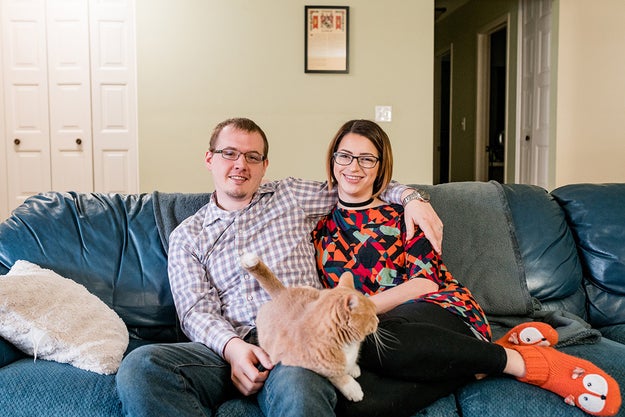
Dustin and his wife Sam at their home in Grand Blanc, Michigan.
Nick Hagen for BuzzFeed News
Dustin, age 28
Location: Grand Blanc, Michigan
Annual salary: $80,000
Monthly housing cost: $1,200
Student loans: $68,000
Monthly car payment: $320
Monthly health insurance premium: $240 (including spouse)
Relationship status: Married
I’m an engineer and have primarily worked in automotive. Really, the only industry in the area that pays that much is automotive.
I graduated from high school in 2007, but I didn’t graduate from college until 2015. I transferred schools a couple of times and lost some credits, and I also spent six months in the Marines. It took eight years for me to graduate, and I’m not a doctor.
Eighty thousand is pretty high in the area. Here, it’s enough to not have to worry about daily bills, grocery, gas. We’re not rich, and it’s not enough to just do what you want, but it’s a lot more than average. My wife, Sam, describes it as enough to splurge at Sephora without feeling like you’ll break the bank. I don’t have to worry about utilities or the cars. If I need new clothes, I can get them.
When I only made $47,000, that wasn’t quite as easy, and you had to pay attention to groceries and there wasn’t so much buying of video games. It made a big difference to jump up to the mid-seventies.
We’re right near Flint, but Grand Blanc is a pretty decent city and we were able to get a nice house in a decent subdivision. It was built in 1971 but has been updated quite a bit. The living space is 1,500 square feet. It’s got three bedrooms, two and a half bathrooms, a full basement. The house was $150,000. It was undermarket — the family needed to move so we gave them the minimum they were willing to take.
We’ve got a really nice back porch, which is one of the main reasons that we bought the house. We just got a new hot tub to replace the broken one that came with the house. I didn’t know how much hot tubs cost, but the one we got was $15,000. It’s got really nice jets, where two of the corners have full-on massage jets that go up and down and spin, and spinny jets everywhere else, and a water fountain thing in it. We got that on a plan for about $200 a month for about four years.
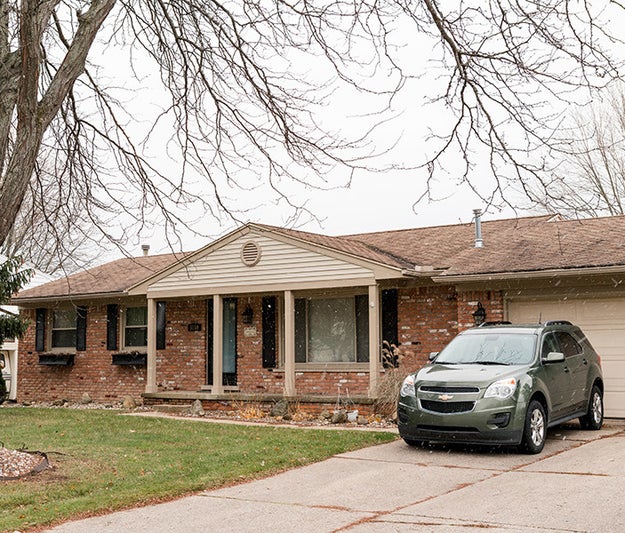
The Chevy Equinox outside Dustin's home in Michigan.
Nick Hagen for BuzzFeed News
Right now, our bills come out to a little less than $4,000 per month. We still keep a budget at this point. Whatever spare money we have goes to paying down debt.
We have some student loans: Mine are about $68,000 and Sam’s were about $30,000. Our total credit card debt is about $4,000; it was $11,000 and we did a consolidation loan to pay off credit card debt we racked up in college. My car payments are $320 — I’m leasing a Buick Regal — and Sam’s are $420 a month for a Chevy Equinox.
To be honest, when it comes to money, I mostly look at my parents and try to not do what they did. My parents didn’t really have any money and my dad had a lot of drug problems. Multiple times we had the power shut off, the lights shut off. If we ever did have money, he’d spend it really quickly, like go on a Best Buy spree and buy TVs and sound systems and spend $10,000 in a day just because he could. I try not to do that.
I love where I’m at, but the $100,000 mark is where I’ll plateau. It’s an extra digit, so there’s the mental thing, and I’ll be able to do the vacations I’ve always wanted, to just go to the airport and fly to a random place.
Andrew, age 28
Location: Orange County, California
Salary: Approximately $70,000
Monthly housing cost: $1,800
Student loans: $0
Monthly car payment: $0
Monthly health insurance premium: $600 (including spouse and child)
Relationship status: Married
It’s a relatively comfortable salary, but it’s difficult in the area I live in.
I’m a behavioral health registered nurse. I’ve got a wife and a nearly 2-year-old and live on a single income at the moment. It’s pretty tough. If I was single, or it was just me and my wife, it would be really easy on my salary. But for a growing family — even with one kid, but especially if you have two or more — and I’m the only income earner, it’s not nearly enough in the OC area.
We’re renting out a two-master-bedroom apartment in La Habra for $1,800. It’s a walk-up in a complex with a little over 100 apartment homes in a gated community. It’s like a townhome, only two stories tall, and someone lives beneath us. I’ve lived my whole life with my parents prior to this.*
Me and my wife are looking at moving to Henderson, Nevada, near the Las Vegas area. Las Vegas is a frequent haunt for us and as rich as Las Vegas is, they wouldn’t be taxing me like in California, where they gut my paycheck. My wife and I just got married there in July. We [had] a very simple $200 to $300 event with close family and friends.
We were doing a lot of home searching around the OC area, but at the prices we saw, it didn’t make a lot of sense. A three-bedroom, two-bath costs upwards of $650,000 and $750,000 here, and it would be old. If you go out of state to Nevada, the Henderson area, it’s probably $250,000 to $350,000. It’ll take us about four or five years to move.
Our big expenses now are rent, our daughter, food. Utilities aren’t too bad and we have no outstanding loans. My car was a gift from my parents, and my wife had a hand-me-down Dodge Stratus. Currently, my wife takes care of our child, but she has a degree in medical assisting and is anxious to go back to work. But if we ended up putting my daughter in a day care, it would take more out of her paycheck than she could contribute.
I’ve been saving money every month for both a home and my daughter’s college savings. I’ve been able to put aside $50 per month at least for her, but I feel like, is this going to make a dent in any tuition fees? But any little bit helps, I figured. Ally Bank has a 1.15% APY, so I keep putting money into that. Whenever I have extra, I put it away in a separate account I have for a house.
We were never that wealthy growing up. A lot of people have told me I’m thrifty or frugal. Like, I’ll fight tooth and nail for a missed credit card payment. That’s me. I hate paying for anything I don’t need to or that I don’t use. And we try not to eat out. We buy our groceries at a store called Aldi’s that’s really affordable. Milk here can cost $3 a gallon, and at Aldi’s, it’s probably under $2.50.
At the rate that I am able to go, saving what I have been, there’s no leeway for pleasure. Once a year, it would be nice to take a week, or two at the most, to go to Hawaii or Disney World with my daughter. To just go visit somewhere outside. I’ve never had the opportunity to visit outside the country and experience other cultures, which always seemed like an awesome thing to do, but just financially a burden.
*Editor’s note: By publication, Andrew and his family had moved in with his parents.
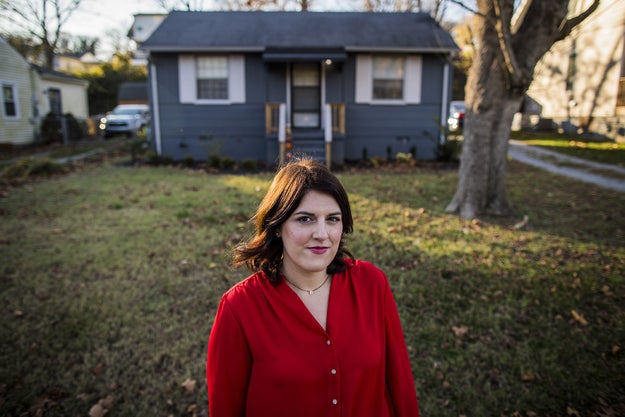
Bonnie outside her home in Nashville.
Joe Buglewicz for BuzzFeed News
Bonnie, age 32
Location: Nashville, Tennessee
Salary: $75,000
Monthly housing cost: $1,300
Student loans: $38,000
Monthly car payment: $150
Monthly health insurance premium: $0
Relationship status: Unmarried
I just moved to Nashville a few months ago. It’s a very interesting time to be living here because so many people are moving here and the cost of living is increasing dramatically. I just read that, to live comfortably in Nashville, you need to make at least $70,000. I lived here about five years ago and the rent has doubled since then.
I live alone and I rent a small house. It’s two bedrooms, one bath, 650 square feet, with a yard. I have two pets. Affordable housing is a big concern in Nashville now. Because I make a comfortable amount of money, I can afford to live alone, but my rent now isn’t much less than when I lived in Boston, which is kind of crazy.
I am on the marketing team at Buffer [a social media company], where all salaries are transparent. It’s nice because you know going in what the salary formula is. I used to work for a nonprofit, doing grant writing for an organization in Boston. I enjoyed the work and it was a cause that’s close to my heart, but my salary was less than $50,000. It was a struggle. I was not in a great place financially, and just now I am getting in a good place with all of my loans. It’s a sizable chunk of my take-home pay every month.

Bonnie with one of her two pets.
Joe Buglewicz for BuzzFeed News
I went to Oklahoma City University, a small liberal arts university, and studied sociology. It’s a lovely school, I got a great education, but that’s a little bit of a cautionary tale, maybe. I thought, “Oh, it’ll be fine; I’m going to get a good education. I’ll just take out student loans to cover what scholarships don’t, and I’ll get a good job because I’ll get a good education.” And it doesn’t necessarily work like that, especially when you have a degree in sociology. I don’t regret the education I got, but I do regret not going to the more affordable school. If you want the freedom to travel and [do] other things, your student loans will be a consideration in that.
I had about $20,000 in student debt, but then I did an occupational therapy assistant program and I took on more debt to cover that — and I ended up not wanting to do that, either. Again, probably not the best decision. I’ve taken quite a long journey to get to where I am now.
I have close to $38,000 in student loans total. I honestly haven’t paid off that much because when I was working in nonprofits I was behind on some, or just paying minimum payments. I’ve probably only paid off $10,000 to $15,000. Now I try to pay an extra $500 to $700 on my student loans on top of the minimum, but it depends on life. I don't usually have an extra $500 to apply to student loans each month. For example, my dog got sick and I had to pay for X-rays and ultrasounds.
If I could pay off my student loans, I’d be totally comfortable making this amount of money. I’d feel perfectly happy. Student loans are the only thing that gives me some anxiety. I have tried to refinance, but I got rejected. Back when I couldn’t afford to pay all my loans, I had some late payments.
It’s funny because, as a kid, $75,000 would have sounded like so much money! Like, oh my god! I remember thinking as a kid, if I get a job that paid $50,000, my life would be so good! Even now, I’m in my thirties, I’m way past $50,000 now — but also, wow, you have so many other things you have to pay for. I don’t know how people can afford to buy a house or have a baby. I guess they just have different jobs.
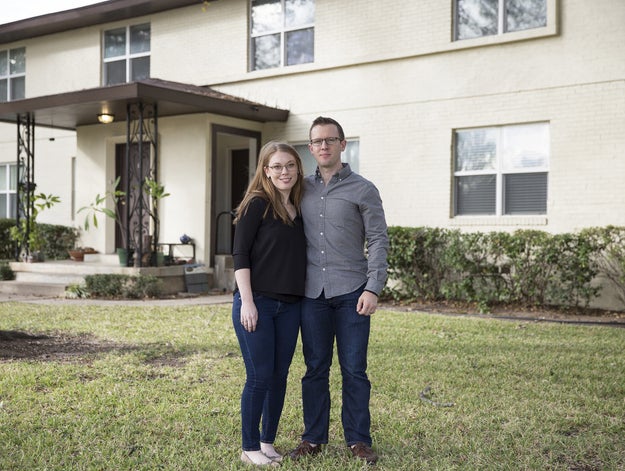
Ross and his wife, Danae, outside their apartment in Fort Worth, Texas.
Laura Buckman for BuzzFeed News
Ross, age 30
Location: Fort Worth, Texas
Salary: $74,000
Monthly housing cost: $850
Student loans: $110,000
Monthly car payment: $230
Relationship status: Married
I was fortunate enough to find a job while I was still in college, but I only made $35,000. That was rough, and I definitely was broke. All of my money went to rent and gas because I had to commute to Dallas. After a few years, I was able to get a job at a defense contractor, which is when I started making $74,000.
I was so shocked when I got this job. I had been out of college for about a year, and I was immediately making more than 90% of my friends. It blew my mind. I was excited, but I immediately knew that almost all of that money would go to student loans — I owe about $110,000. It’s almost like a mortgage.
I could have taken out less. I was irresponsible. There was one semester where I took out extra to buy an Xbox. I would go back and grab myself and say, “What are you doing?!”
Getting this job was a load off my back because [before] I had only been able to pay the minimum on my loan. Now I pay around $600 a month, but the interest rate is so high that the balance seems to stay about the same. I probably should be paying $1,500 a month to get it down.
My wife just got her master’s a few months ago, and we just moved into a nicer place in a nice neighborhood called Arlington Heights. It’s $850 a month, two bedrooms, one bathroom, hardwood floors. It’s in a big building. We love it. The upstairs neighbor has a kid that runs around a lot, but I’ll put up with it.
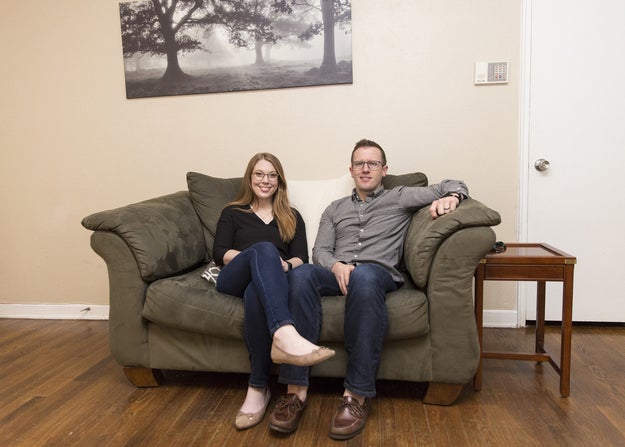
Ross and Danae inside their home.
Laura Buckman for BuzzFeed News
from BuzzFeed - Tech https://www.buzzfeed.com/venessawong/how-much-75000-salary-gets-different-us-cities?utm_term=4ldqpia
No comments:
Post a Comment